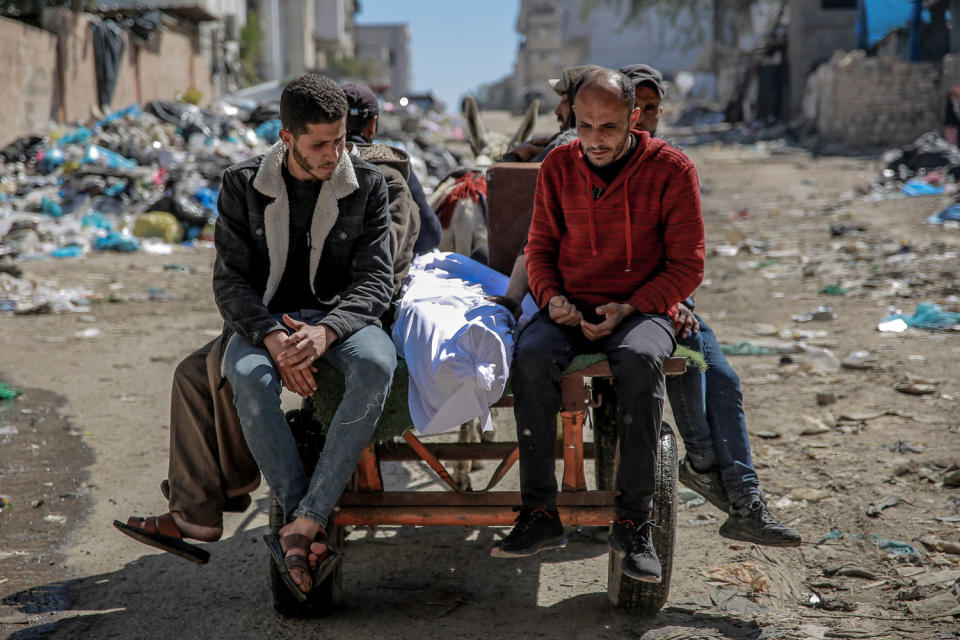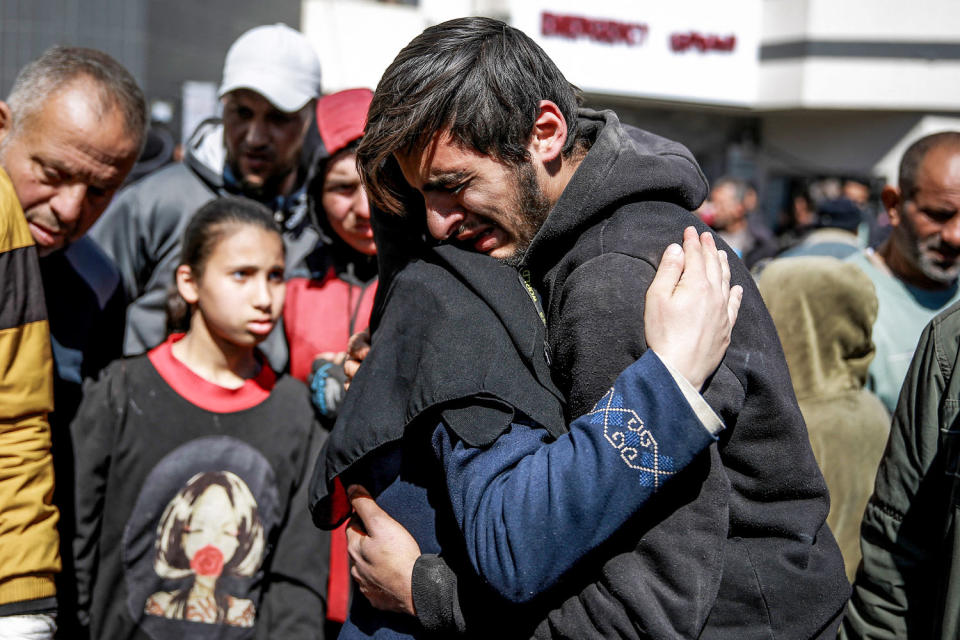As Gaza death toll tops 30,000, is Israel on the path to victory or quagmire?
As the death toll in Gaza tops 30,000 and international criticism mounts, Israeli forces believe they are on the path to victory in their offensive against Hamas. But the Palestinian militants are still fighting and could yet draw Israel into a long quagmire like past conflicts in Lebanon, former U.S. military officers and analysts say.
After four months of hammering, Israel says it has severely damaged the capacity of Hamas to fight, killing about 12,000 of its roughly 30,000-strong army and destroying much of its arsenal.
Israeli commanders and officials say Hamas is under growing pressure, with no way to replenish its weapons or ammunition and increasingly restricted in its movements.
Brig. Gen. Dan Goldfuss, commander of the Israel Defense Forces 98th Paratroopers Division, told NBC News that top Hamas leaders are now unable to direct their troops in real-time combat because they have no way to communicate securely.
“They’ve lost command and control,” said Goldfuss.

As for the massive network of tunnels under Gaza where Hamas moves its fighters, equipment and hostages, Goldfuss said Israeli forces have seized the main arteries. “We are in the most important tunnels,” he said. “We are maneuvering in the most important tunnels.”
A senior Biden administration official agreed that Hamas’ leadership, infrastructure and weapons storage sites have been hit hard. The Israeli operation “has absolutely had an effect on their morale and their ability to continue to function,” the official said.
But as Israel prepares for what it says is a final push against Hamas in the southern city of Rafah, one U.S. official said Hamas is “degraded but still capable.”
Hamas’ top leaders are still alive, the group still holds more than 100 Israeli hostages, it continues to battle Israeli troops on the ground and — even based on Israel’s aggressive casualty estimates — has 18,000 fighters left. And the massive civilian death toll in Gaza, like the dozens killed Thursday by Israeli forces as they rushed aid trucks in search of food, keeps stoking global criticism of Israel.
The chair of the Senate Intelligence Committee, meanwhile, told NBC News he was surprised to learn that only a “miniscule” portion of the Hamas tunnel network, which may stretch for 300 miles, has been cleared. “The amount of the tunnels that they’ve been actually fully able to clear, fully secure is tiny,” said Sen. Mark Warner, D-Va. “It’s stunningly small.”
Israel’s estimate that it has killed roughly 40% of Hamas’ fighters is significant but suggests there is still a substantial armed force on the ground, said the former head of U.S. Central Command, retired Army Gen. Joseph Votel, who oversaw the U.S.-led war against the Islamic State group in Syria and Iraq.
“That’s not nothing,” he said. “But what that does tell you is there are a lot of fighters left.”
Although Israel’s military is “making progress,” he said there are indications “they still have got an awful long way to go, and it’s going to continue to be a difficult campaign.”
‘Total Victory’
Israel launched its offensive after Hamas militants swarmed over the southern Israeli border on Oct. 7, killing some 1,200 people, most of them civilians, and taking roughly 240 hostages in the worst terror attack in the nation’s history.
Israeli leaders vowed to “destroy” Hamas to ensure it can never stage another similar attack, and to help create a new government for Gaza. But they never precisely defined the political and military goals for the campaign or the exact meaning of “destroy.”
It’s unclear exactly how much damage the Israel Defense Forces have inflicted on Hamas over the past four months, and NBC News could not independently verify the IDF’s claims about Hamas’ casualties. A Hamas official in Qatar recently told Reuters the group had lost 6,000 fighters, half the Israeli estimate.
Some security analysts say Hamas is now unable to access many of its tunnels and Israel will blow up the underground maze once the current military operation ends.

Whatever the military results of the campaign, Israel has suffered a blow to its international image over the steep civilian toll in Gaza.
With 31,000 air strikes, the offensive on the densely populated enclave has caused massive damage to infrastructure and killed more than 30,000 people, two-thirds of them women and children, say Palestinian health authorities. Amid the worldwide outcry over Israeli tactics, the Biden administration has repeatedly appealed to Israel to scale back military operations and allow more access for humanitarian aid.
Israel, however, has refused to pull back and been reluctant to agree to a long-term cease-fire, saying the systematic murder of civilians in the Oct. 7 attack has altered the country’s mindset about how to respond to Hamas.
“We can’t leave the last Hamas stronghold without taking care of it. Obviously, we have to do it,” Israeli Prime Minister Benjamin Netanyahu said this week. “It has to be done. Because total victory is our goal, and total victory is within reach.”
Avi Melamed, a former Israeli intelligence official and negotiator, said eliminating Hamas entirely is “not a realistic objective” and that “Hamas is not going to disappear.”
But he said the key goal is to dismantle Hamas’ military reach and power, so that it can no longer operate as a small army.
Once the IDF advances into Rafah in the south, “we will be done with the phase of crushing the major spine of Hamas’ military capacities,” and the next step would be lower intensity warfare to sweep up the remaining elements of Hamas, Melamed said.
Some analysts and former U.S. officials say, however, that even a remnant of the group’s militants could remain armed and influential in the enclave. In that case, Hamas could potentially undermine more moderate political elements in Gaza and force Israel into an exhausting occupation.
“If Israel pulls out its troops and some other government comes in, that government could not survive in the face of Hamas opposition without significant outside help,” said Daniel Byman, a senior fellow at the Center for Strategic and International Studies.
In that scenario, with no reliable local security force to turn to, Israel could potentially be drawn into a fraught occupation with no clear way out, said Colin Clarke, a senior research fellow at the Soufan Group, a nonprofit focusing on global security issues.
“Hamas isn’t going to stop fighting, and also, they can’t go anywhere. They’re not leaving,” Clarke said. “So if the Israelis don’t leave, and Hamas doesn’t leave, what’s the endgame there?”
Clarke and other analysts say the situation in Gaza could end up resembling Israel’s troubled experience in southern Lebanon in the 1980s and ’90s. In 1982, Israel moved into southern Lebanon to evict the Palestinian Liberation Organization but stayed for nearly two decades, having failed to stamp out Lebanese and Palestinian militants.
“They withdrew from it (Lebanon) in 2000 unilaterally, and they never solved the problem. In fact, they left Hezbollah stronger than ever,” said Randa Slim, a senior fellow at the Middle East Institute think tank.
“I think they’re going to repeat the same failed experiment” in Gaza, she said.
Israel’s long-running military presence in southern Lebanon enabled the Iranian-backed Hezbollah militia to attract thousands of volunteers, Slim said, and the Israeli offensive in Gaza could have a similar effect.
Israel’s reliance on heavy aerial bombing in Gaza could also prove to be counterproductive, as it risks fueling resistance for years to come, according to Robert Pape, a military strategy and counterterrorism expert and political science professor at the University of Chicago.
“Israel’s military operations are producing more terrorists than they’re killing,” Pape said.
This article was originally published on NBCNews.com

